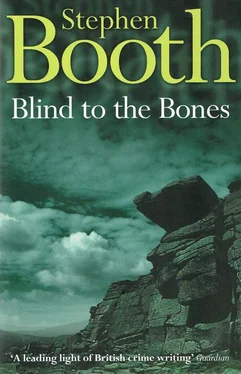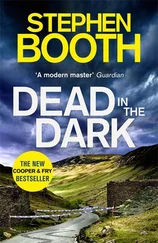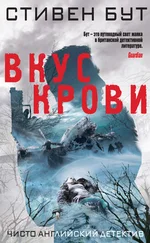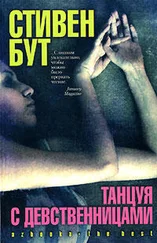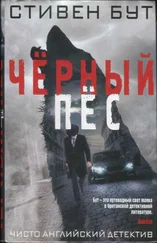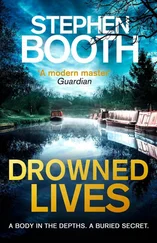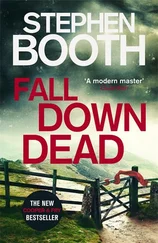‘But you said there’d be nobody in.’
‘None of the men. But we don’t want to frighten Mrs Wallwin at number 7. And Wendy Tagg is probably at home with the children.’
Rain was getting through the roof in several places. They could hear it dripping on the ceilings above them, like the sound of tiny footsteps. In the corner of one of the bedrooms, a stream of water glittered against the mouldy wallpaper. A rotten floorboard snapped under Fry’s foot. Cooper put out a hand to steady her. When he touched her shoulder, he was surprised to find that she was trembling.
‘Are you all right?’
‘Fine.’
Cooper pointed the beam of his torch towards the bathroom at the end of a short passage. The porcelain toilet bowl, washbasin and bath were still in there. They gleamed in the light.
‘You think we might find a stash of antiques in here, then?’ he said.
‘I don’t know. There’s a stash somewhere, that’s for sure. They can’t be shipping them constantly.’
Cooper stuck his head inside the door of the bathroom. ‘Heck, I bet there are some big spiders living in that bath.’
‘Where?’
‘Only kidding. There’s nothing up here. No attic trap door. I wonder if there’s a cellar.’
‘God.’
He couldn’t quite see Fry’s face, because she was looking back towards the stairs.
‘If there is, I’ll go down. You can wait by the back door.’
‘I’m fine. Really.’
Cooper trod carefully back down the stairs and into the front hallway.
‘If there is a cellar, the door will be under the stairs. Ah, yes.’
‘It could just be a cupboard,’ said Fry.
‘I don’t think so.’
The door stuck a little, but Cooper tugged at it, and a stream of cold air emptied into the hallway.
‘It’s probably a small keeping cellar,’ he said. ‘They were very handy, before the days of fridges. On the other hand, it might run under all eight houses in the terrace.’
‘If we’re going down, let’s go,’ said Fry. ‘Stop talking about it.’
‘All right, all right. Chill out.’
‘Very funny.’
The steps were made of stone, and the little cellar felt terribly claustrophobic. Cooper could sense the hillside behind the walls, the heavy mass of peat and rock that would force its way through one day, if left to itself.
‘See, there’s a stone slab this side, and a chute in the top of the wall there. That will be at ground level outside. They must have delivered coal down here. What’s on your side, Diane?’
‘Some wooden cupboards built into the wall.’
Cooper heard the creak of a hinge as she opened one of the cupboard doors. Then there was a sudden scuttling of claws on wood and a scream that almost deafened him.
‘Oh, shit!’
The light of Fry’s torch swung wildly and there was a loud crash, followed by another scream, this one higher pitched and almost ear-splitting in the confined space of the cellar. Fry continued cursing.
‘What the hell’s going on?’
‘Over here!’
‘Diane, keep that torch still. I can’t see a thing.’
Her beam was flickering everywhere, but illuminating nothing. Mostly, it seemed to be in Cooper’s eyes. The screaming became ragged, but something was scraping repeatedly against a wooden surface.
Finally, Cooper managed to get his torch pointed in the right direction. Fry had disturbed a female rat from its nest in a pile of mouldering newspapers and shredded wool inside the cupboard. A hole had been chewed through the back corner, and the rat was trying to drag itself towards it. But Fry’s panicked blow with her torch had injured it. Its back legs were trailing uselessly, and its front paws could hardly move its weight along.
‘Oh God. What are we going to do with it?’ said Fry.
‘Hold on. Let me borrow your torch. It’s heavier than mine.’
Cooper crouched to the cupboard door and manoeuvred his body between Fry and the rat, which had stopped screaming now. Gingerly, he used the end of the torch to poke the rodent into a clear area and made sure it was lying upright. Then he took aim, swung the torch and crushed the base of its skull with one blow. It lurched over on to its side and its legs kicked for a few seconds before it died.
He stood up and shut the cupboard door.
‘All sorted,’ he said, as he handed the torch back.
‘I didn’t even see what you did,’ said Fry.
‘No.’
She pointed her torch at the closed door. ‘Thanks.’
‘No problem.’
Cooper just hoped Fry hadn’t seen the little heap of blind, hairless shapes squirming at the bottom of the rat’s nest. There was nothing to be done about those.
Back up the stairs, Fry swept her torch round the sitting room, picking out a pile of empty beer bottles, an old sweater slung over a broken chair, a used paint tin half-full of cigarette ends.
‘This is wrong,’ she said. ‘We need to get a proper search organized. We could be contaminating evidence.’
‘These houses were empty when Neil Granger lived down here, you know.’
‘I do know. That’s why it’s wrong. I lost my witness, and I don’t want to lose any forensic evidence. If there’s anything in here to be found, it should be found properly. We need the task force and some SOCOs in here.’
‘Diane, it could be days before we get that type of operation approved and put into action. We’re here now. There’s nobody to interrupt us. Besides, these houses may not even be here much longer.’
Fry began to back towards the door, treading carefully to avoid debris. ‘No, Ben. I should never have let you talk me into it.’
‘Talk you into it? Whenever have I been able to talk you into anything?’
‘Quiet,’ said Fry. ‘They’ll hear you across at Waterloo Terrace. It’s best they don’t know we’ve been here. Damn it, we could have screwed everything up, doing this.’
Cooper bit his lip with frustration. ‘OK, Diane. Back to the cows, then. The bigger they are, the easier they are to cope with.’
Derek Alton could see exactly where Neil Granger had died — right there, on the scrubby grass, among the sheep droppings and the scattered stones, with the wind scraping across the exposed sides of Withens Moor. It was here that his body had grown cold and his blood had soaked into the runnels of dark water that drained from the higher slopes. And perhaps it was on this particular rock here that the crows had waited impatiently for his life to be gone.
Alton had attended the opening of the inquest, and he remembered the crows being mentioned. The pathologist had explained why some of the injuries on the body were not, in themselves, an indication of unlawful killing. Firstly, the injuries to his face had occurred after death. And secondly, they had not been of human origin.
There was still blue tape rattling in the breeze, though one of the metal stakes the police had used had fallen over now, the shallow covering of peat failing to provide a secure anchor for it in the ground. But Alton wasn’t looking at the fluttering tape. He was watching the faint white clouds of steam drifting from the air shaft, coiling on the edge of the stones for a moment before being dispersed by the wind.
He knew he had been stupid to let himself get involved in the Border Rats’ raid on the Hey Bridge well dressing. He had thought he was being accepted at last by the Oxleys — or that was what he had told himself. But it had been a mistake, and the Rural Dean had made that clear. His reputation was already damaged by a misjudgement. But that wasn’t what was worrying Derek Alton most.
That afternoon, when he had looked again at the picture of St Asaph in the stained glass, he realized that the red representing the burning coals was the wrong colour. It was too pale when the sunlight caught it, too gentle in its tones — almost pink, in fact. There was nothing threatening about it, nothing that suggested a danger of scorching St Asaph’s cloak.
Читать дальше
Конец ознакомительного отрывка
Купить книгу
